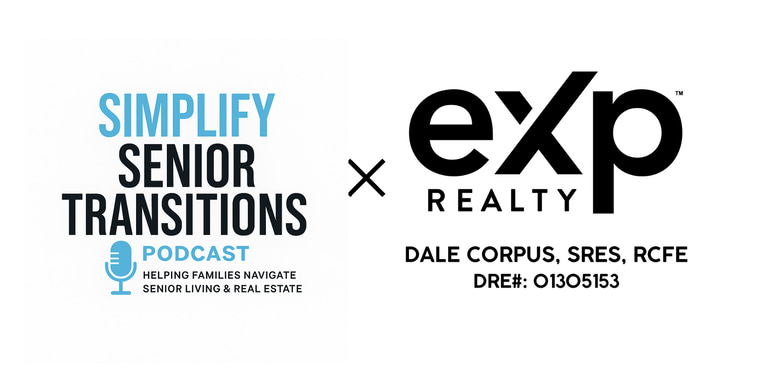Avoid These Costly Mistakes When Selling a Senior’s Home
How Bay Area Families Can Save Time, Money, and Stress During the Senior Home Sale Process
Dale Corpus
10/25/20254 min read
Avoid These Costly Mistakes When Selling a Senior’s Home!
Overwhelmed in the Bay Area? 7 Mistakes to Avoid When Selling Your Aging Parent’s Home
If you’re an adult child caring for an aging parent in the Bay Area — whether you’re in Contra Costa, Alameda, Santa Clara, San Mateo, San Francisco, Solano, or Napa counties — you know how overwhelming this journey can be. Navigating the transition to senior living often means tackling the complex, stressful, and deeply emotional task of selling the family home.
Selling a senior’s home is more than just a real estate transaction; it represents decades of memories. Unfortunately, many families make costly mistakes that delay the sale, reduce the home’s value, and create unnecessary stress during an already emotional time.
In this post, we’re drawing key insights from senior transition specialist and real estate expert Dale Corpus, who shares practical advice on how to avoid these common pitfalls.
What You'll Learn in This Episode:
Why delaying the home sale process can lead to serious financial strain, especially when financing senior care.
How to manage the emotional challenges that cause parents to delay selling their long-time home.
The crucial legal and financial steps you must take early, like checking ownership status and power of attorney (POA).
Why spending thousands on repairs and renovations might not give you the return you expect in the competitive Bay Area market.
The benefits of exploring off-market sale options if you need fast access to funds or want to avoid repairs, staging, and open houses.
Plan Early to Avoid Financial and Emotional Strain
One of the biggest pitfalls families face is waiting too long to start the process. Dale recently worked with a family who waited until their mother was already placed in assisted living before beginning the home sale.
The consequence? They had no liquid funds, as the facility required payment upfront, forcing them to scramble for bridge financing that could have been entirely avoided with planning. Starting the process early — even if your loved one is still living at home — ensures a smoother transition and greater financial security.
Beyond logistics, we cannot underestimate the emotional challenges. For many seniors, the home holds decades of memories, making the decision to let go extremely difficult. This emotional difficulty often causes parents to delay the sale, creating tension and stress between parents and their adult children.
The solution is to have open conversations and, if necessary, work with a senior move manager or transition specialist to ease the process. It is critical to take time to acknowledge these strong emotions while still making progress on the sale.
Navigating Legal Roadblocks and Repair Traps
Before you list the home, you must address the legal landscape. A major mistake is not knowing the legal and financial requirements.
If your loved one is alive but unable to make financial decisions, you likely need a Power of Attorney (POA). If they have passed away and the home wasn’t in a trust, it may require probate, which can add months of delays.
Dale has seen families attempt to list a home only to find out they lacked the legal authority to sign the sale documents. The proactive solution is to check the home's title and ownership status early to prevent these expensive roadblocks. If you need guidance on this step, connecting with trusted estate planning attorneys is essential.
Another common financial mistake is spending too much on repairs and upgrades. Families often assume they need to renovate heavily before selling. However, the return on investment (ROI) isn’t always guaranteed.
Dale shared an example of a family who spent $40,000 on renovations hoping for a $100,000 increase, but the home only sold for $50,000 more — meaning they barely broke even. The smart move in many competitive Bay Area markets is to know your market. Homes in “as is” condition often sell at competitive prices, making selling as-is the potentially better option if repairs are not strictly necessary.
Smart Strategies for a Quick, Hassle-Free Sale
When it comes time to price, avoid overpricing the home. Sentimental value often leads seniors and their families to overestimate the home’s worth.
An overpriced property sits on the market longer, resulting in lower buyer interest and eventual price reductions. Dale recalls a family who insisted on listing $75,000 above market value due to sentimental attachment; it sat for three months until they reduced the price, and it sold within two weeks.
Work with a real estate expert who understands the senior home selling process to ensure correct pricing from the start for a faster sale.
Finally, don't make the mistake of not considering all off-market sale options. While the traditional market is standard, it may not be the best route, especially if you need to sell quickly or avoid the stress of preparing the home.
Selling off-market means:
No repairs or staging
No open houses
Closing in as little as 7 to 21 days
Selling “as is” without spending money on updates
This fast, low-hassle option is ideal for families needing quick access to funds. Exploring off-market options first can simplify your transition significantly.
Need Expert Help Navigating the Sale of Your Senior’s Home in the Bay Area?
Selling a senior's home doesn't have to be a nightmare. If you're ready to make a plan and avoid these costly mistakes, schedule a FREE consultation with Dale today at www.simplifyseniortransitions.com.
You can also listen to the full episode for detailed insights or contact Dale directly with quick questions via Instagram @soldbydale.
P.S. Got news or an amazing story to share? Email dale.corpus@exprealty.com and you might be featured in our next episode!
Watch The Podcast Here



Transitions Made Simple
Helping seniors transition with ease and peace.
📍 Serving the San Francisco Bay Area
📞 GET IN TOUCH
📬 STAY INFORMED
Dale Corpus, SRES, RCFE
📱 925-380-1657
📧 dale@simplifyseniortransitions.com
🕓 Available for free 15 min consultations by appointment
© 2026. All rights reserved.
Sign up for monthly senior transition tips & real estate insights.
